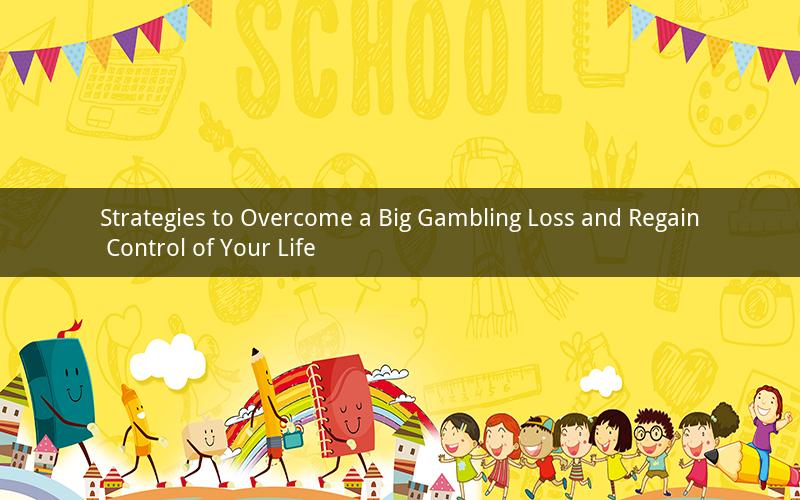
Introduction:
Losing a substantial amount of money through gambling can be a devastating experience. The emotional and financial toll can leave individuals feeling overwhelmed, lost, and unsure of how to recover. However, it is possible to bounce back from a big gambling loss and regain control of your life. In this article, we will explore effective strategies to help you overcome this challenging situation and move forward.
1. Acknowledge and Accept the Loss
The first step in recovering from a big gambling loss is to acknowledge and accept the reality of the situation. Denial or refusal to face the truth will only hinder your progress. Recognize that gambling is a form of entertainment and that it is possible to lose money. Accepting the loss is crucial for healing and moving forward.
2. Seek Support from Trusted Individuals
During this difficult time, it is essential to lean on friends, family, or support groups. Sharing your feelings and experiences with others who understand can provide emotional support and guidance. Consider joining a support group specifically for gambling addiction, such as Gamblers Anonymous, where you can find empathy and advice from individuals who have gone through similar experiences.
3. Set Realistic Goals and Create a Plan
Establishing clear, achievable goals is essential in overcoming a big gambling loss. Determine what you want to accomplish, whether it is financial stability, rebuilding relationships, or gaining control over your gambling habits. Create a detailed plan outlining the steps you will take to achieve these goals. This plan should include specific actions, timelines, and resources required.
4. Develop Financial Management Skills
Learning how to manage your finances effectively is crucial in recovering from a big gambling loss. Begin by reviewing your financial situation and creating a budget. Track your income and expenses, prioritize necessary expenses, and set aside funds for emergencies. Consider seeking the assistance of a financial advisor to help you regain financial stability and avoid future gambling problems.
5. Seek Professional Help if Needed
If you find it challenging to overcome your gambling loss on your own, seeking professional help is a wise decision. A therapist or counselor specializing in gambling addiction can provide personalized support and guidance. They can help you understand the underlying causes of your gambling behavior, develop coping strategies, and overcome any emotional or psychological barriers.
6. Explore Alternative Activities
Finding alternative activities to replace gambling can be beneficial in overcoming a big gambling loss. Engage in hobbies or interests that provide fulfillment and enjoyment. This could include sports, arts, music, or any other activity that allows you to express yourself and spend time constructively. By redirecting your energy towards positive activities, you can reduce the temptation to gamble.
7. Establish Boundaries and Avoid Triggers
Identifying and avoiding triggers that may lead you back to gambling is crucial in recovery. These triggers could be places, people, or situations associated with gambling. Establish clear boundaries for yourself, whether it is avoiding certain locations or limiting your exposure to gambling-related content. Staying vigilant about these triggers can help prevent relapse.
8. Practice Self-Compassion and Patience
Recovering from a big gambling loss is a gradual process that requires patience and self-compassion. Be kind to yourself during this journey, acknowledging that setbacks are a natural part of the process. Avoid self-blame or negative self-talk, as these thoughts can hinder your progress. Remember that recovery is a marathon, not a sprint, and it is essential to stay committed to your goals.
9. Stay Connected with Your Support System
Maintaining a strong support system is crucial in overcoming a big gambling loss. Regularly connect with friends, family, or support group members who understand your situation. Share your progress, seek advice when needed, and celebrate milestones along the way. A strong support network can provide encouragement, accountability, and a sense of belonging.
10. Continue Learning and Growing
Recovery is an ongoing process, and it is important to continue learning and growing. Attend workshops, read books, or attend seminars on financial management, addiction, and self-improvement. By continuously educating yourself, you can equip yourself with the knowledge and tools necessary to maintain long-term recovery.
Q1: How can I stay motivated during the recovery process?
A1: Staying motivated can be challenging, but setting small, achievable goals and celebrating milestones can help. Remind yourself of the positive outcomes you desire and seek support from others who can provide encouragement and motivation.
Q2: What should I do if I feel the urge to gamble again?
A2: If you experience an urge to gamble, remind yourself of the consequences of relapse and the progress you have made so far. Reach out to your support system, engage in alternative activities, or distract yourself until the urge passes.
Q3: How can I rebuild trust with my loved ones after a big gambling loss?
A3: Rebuilding trust takes time and effort. Be transparent about your recovery journey, communicate openly with your loved ones, and demonstrate your commitment to change. Apologize for any hurt caused and work towards rebuilding trust through consistent behavior.
Q4: Is it possible to completely overcome a gambling addiction?
A4: While overcoming a gambling addiction is challenging, it is possible with dedication, support, and professional help. Recovery is a lifelong process, and maintaining vigilance against triggers and temptations is crucial.
Q5: How can I prevent future gambling losses?
A5: To prevent future gambling losses, establish strict boundaries for yourself, create a budget, and avoid high-risk situations. Seek professional advice, consider self-exclusion programs, and surround yourself with supportive individuals who encourage healthy financial habits.